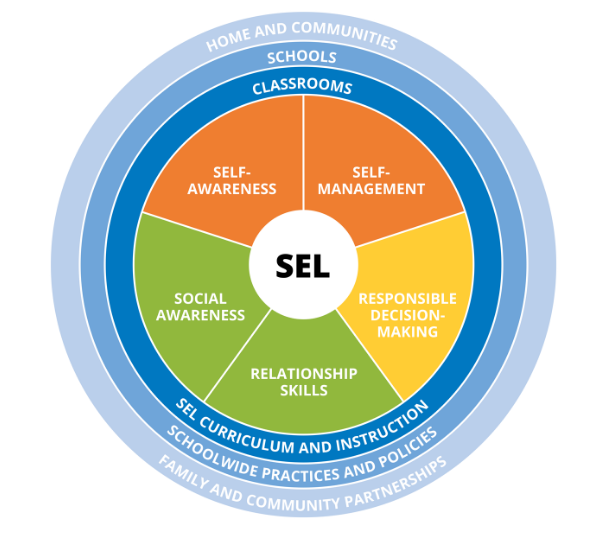Social Emotional Learning
The Illinois State Board of Education developed mandatory social-emotional learning (SEL) standards for all schools to address the whole child's developmental needs. SEL is defined as the process through which children and adults acquire the knowledge, attitudes, and skills to recognize and manage emotions, demonstrate care for others, establish positive relationships, make responsible decisions, and handle challenging situations constructively. These standards explicitly teach five core competencies: self-awareness, self-management, social awareness, responsible decision making, and relationship skills.
Research demonstrates that SEL instruction significantly enhances both academic and behavioral outcomes. Students receiving explicit SEL instruction show an average increase of 11 percentile points on standardized assessments compared to those without such instruction. Quality SEL programs, implemented within safe and responsive school climates, yield multiple benefits including improved mental wellness, reduced absenteeism and suspensions, increased school connectedness, and enhanced academic performance. These outcomes support the standards' goal of preparing students to be college and career ready upon graduation.
The Illinois SEL Standards emerged from the Children's Mental Health Act of 2003 through collaboration between ISBE, the Illinois Children's Mental Health Partnership, and the Collaborative for Academic, Social, and Emotional Learning (CASEL). The framework includes 10 standards with age-appropriate benchmarks and performance descriptors. Implementation occurs through systematic integration into existing curricula and school structures, capitalizing on natural teachable moments, and providing students with opportunities to practice social-emotional competencies while promoting their sense of autonomy, relatedness, and competence.
ISBE SEL Standards
Goal 1 - Develop self-awareness and self-management skills to achieve school and life success.
Goal 2 - Use social-awareness and interpersonal skills to establish and maintain positive relationships.
Goal 3 - Demonstrate decision-making skills and responsible behaviors in personal, school, and community contexts.
SEL Competencies

Self-awareness
The ability to accurately recognize one’s own emotions, thoughts, and values and how they influence behavior. The ability to accurately assess one’s strengths and limitations, with a well-grounded sense of confidence, optimism, and a “growth mindset.”
- Identifying emotions
- Accurate self-perception
- Recognizing strengths
- Self-confidence
- Self-efficacy
Self-management
The ability to successfully regulate one’s emotions, thoughts, and behaviors in different situations — effectively managing stress, controlling impulses, and motivating oneself. The ability to set and work toward personal and academic goals.
- Impulse control
- Stress management
- Self-discipline
- Self-motivation
- Goal-setting
- Organizational skills
Social awareness
The ability to take the perspective of and empathize with others, including those from diverse backgrounds and cultures. The ability to understand social and ethical norms for behavior and to recognize family, school, and community resources and supports.
- Perspective-taking
- Empathy
- Appreciating diversity
- Respect for others
Relationship skills
The ability to establish and maintain healthy and rewarding relationships with diverse individuals and groups. The ability to communicate clearly, listen well, cooperate with others, resist inappropriate social pressure, negotiate conflict constructively, and seek and offer help when needed.
- Communication
- Social engagement
- Relationship-building
- Teamwork
Responsible decision-making
The ability to make constructive choices about personal behavior and social interactions based on ethical standards, safety concerns, and social norms. The realistic evaluation of consequences of various actions, and a consideration of the well-being of oneself and others.
- Identifying problems
- Analyzing situations
- Solving problems
- Evaluating
- Reflecting
- Ethical responsibility

